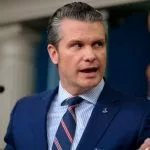
(LONDON and THE PENTAGON) — Defense Secretary Pete Hegseth appeared at his first meeting of the Ukraine Defense Contact Group on Wednesday to tell allies that the liberation of all Russian-occupied Ukrainian territory “is an unrealistic objective.”
“The bloodshed must stop and this war must end,” Hegseth said, in one of the most detailed delineations of the Ukraine-Russia peace deal envisioned by President Donald Trump’s new administration.
“President Trump has been clear with the American people — and with many of your leaders — that stopping the fighting and reaching an enduring peace is a top priority,” Hegseth said at the meeting, which was led by the U.K., marking the first time the group has not convened under U.S. leadership.
“He intends to end this war by diplomacy and bringing both Russia and Ukraine to the table,” Hegseth said. “We will only end this devastating war and establish a durable peace by coupling allied strength with a realistic assessment of the battlefield.”
President Volodymyr Zelenskyy and his government in Kyiv have demanded full territorial liberation — whether by military or diplomatic means — per the country’s internationally-recognized 1991 borders. Among Ukraine’s other demands are binding Western security guarantees, ideally in the form of full NATO membership and Article Five protection.
Hegseth rejected such ambitions, at least in the near term.
“We want, like you, a sovereign and prosperous Ukraine, but we must start by recognizing that returning to Ukraine’s pre-2014 borders is an unrealistic objective,” he told allies. “Chasing this illusionary goal will only prolong the war and cause more suffering.”
“The United States does not believe that NATO membership for Ukraine is a realistic outcome of a negotiated settlement,” Hegseth continued. “Instead, any security guarantee must be backed by capable European and non-European troops.”
“If these troops are deployed as peacekeepers to Ukraine at any point, they should be deployed as part of a non-NATO mission and they should not be covered under Article Five,” he added. “There also must be robust international oversight of the line of contact.”
“To be clear, as part of any security guarantee, there will not be U.S. troops deployed to Ukraine,” Hegseth said.
Trump has repeatedly vowed to end the war by forcing both Moscow and Kyiv back to the negotiating table after nearly three years of full-scale war.
Hegseth suggested that Trump’s domestic energy policies would help pressure the Kremlin. “Lower energy prices coupled with more effective enforcement of energy sanctions will help bring Russia to the table,” he said.
Hegseth delivered a broader warning to European allies of a lighter U.S. footprint on the continent. They, he said, will need to “provide the overwhelming share of future lethal and non-lethal aid to Ukraine.”
He said the “stark strategic realities” of competition with China in the Indo-Pacific and the U.S. focus on securing its domestic borders “prevent the United States of America from being primarily focused on the security of Europe.”
Hegseth called on allies to donate more ammunition and equipment to Ukraine, expand their industrial bases and explain to citizens that the Russian threat necessitates “spending more on defense and investing strategically.”
That will include increasing defense spending beyond the 2% of GDP target agreed by allies in 2014. The threshold — which many NATO allies have still not achieved — “is not enough,” Hegseth said.
“President Trump has called for 5% and I agree,” he added. “Increasing your commitment to your own security is a down payment for the future.”
The defense secretary warned that while the U.S. “remains committed to the NATO alliance and to partnership with Europe,” America “will no longer tolerate an imbalanced relationship which encourages dependency.”
“Rather, our relationship will prioritize empowering Europe to own responsibility for its own security,” he added. “Honesty will be our policy going forward.”
In response to Hegseth’s remarks, British Defense Secretary John Healey said, “We hear you.”
“We hear your commitment to NATO, to Article Five, to a sovereign Ukraine and to your defense partnership with Europe,” Healey said. “We also hear your concerns.”
“On stepping up for Ukraine, we are and we will,” Healey continued. “On stepping up for European security, we are and we will.”
“You’ve just spoken about peace through strength,” Healey said. “We are 50 nations strong here, all determined to put an end to [Russian President Vladimir] Putin’s war, to do so together.”
Copyright © 2025, ABC Audio. All rights reserved.
